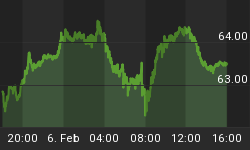Most market watchers would agree that a sustainable market advance should have quality leadership. The banking sector generally is a pretty good candidate to provide such leadership, but over the past 6 months, banks have been amongst the worst performers.
As you can see from figure 1, a weekly chart of the S&P Select Financial SPDR Fund (symbol: XLF), the banking sector peaked in February, 2011 and this ETF has been in a downtrend since. More importantly, there is a key pivot point (red dot) at 14.76. Key pivot points represent the best areas of buying (support) and selling (resistance). A weekly close below this level (14.76) would be an ominous sign for XLF and the markets in general.
Figure 1. XLF/ weekly
But wait a minute, look at the oval with the 3 red dots. This was 1 year ago, the summer of 2010. The blue up arrows show a weekly close below a key pivot point. This should have been bearish, but then came Ben Bernanke and QE3 to save the day. The market reversed and you know the rest of the story.
Bottom line: XLF is sitting at support levels. A breakdown would not be market positive. For obvious reasons, the financial sector is important to watch. If XLF does break down, who is going to save the day?
If you would like to have TheTechnicalTake delivered to your email in box, please click here: It's free!!!















